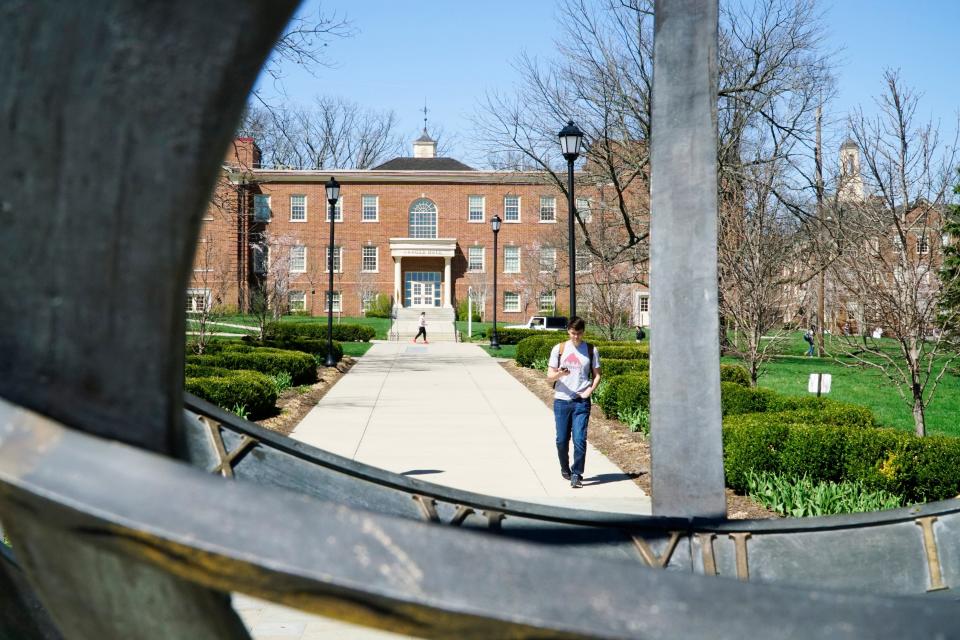'It would be devastating' Ohio college faculty worry about SB 83 ban on Chinese partnerships

Some faculty members at Ohio's public universities are worried that language in state Senate Bill 83 about ending partnerships with Chinese institutions could result in significant cuts to the state's economy and educational offerings.
SB 83, also known as the Ohio Higher Education Enhancement Act, proposes a number of changes that could dramatically alter campus life at Ohio's public colleges and universities. Among the proposals, SB 83 would ban all academic and financial relationships between Ohio's public institutions and those located in China.
Bill sponsor Sen. Jerry Cirino, a Republican from Kitland, told The Dispatch that Chinese partnerships are a national security concern.

"Communist China's activities around the world and to their people are far more egregious than what Russia is doing to Ukraine," Cirino said.
The bill would ban Ohio universities and colleges from accepting donations or gifts from China. The measure would require higher education institutions to report any current partnerships with Chinese institutions to the Ohio Department of Higher Education's chancellor and would bar them from entering into new partnerships.
Cirino said the bill doesn't require universities to break any contracts they currently have in China but would bar renewals and new agreements.
Mitch Lerner, an Ohio State history professor and director of its East Asian Studies Center, said the bill could do real damage to the university's programs.

“If this bill passes in its current form … it would mean a significant loss of funding for programs that connect Ohio to the world in ways that benefit our students and our community — financially, but also socially and culturally, and in ways that simply can't be measured,” Lerner said.
This isn’t the first time that Chinese institutions have been the subject of concern over espionage of technology and other economic intelligence.
In 2021, an Ohio State professor was sentenced in what federal prosecutors described as a scheme to steal biomedical research for China.
It was one of the highest-profile prosecutions of the Department of Justice's China Initiative, aimed at economic espionage, which ended in 2022. Though the program secured some convictions, it was also accused of unfairly targeting Chinese academics in the U.S. with flimsy cases. At least one Chinese professor is suing the FBI.
In 2022, the University of Akron ended its Confucius Institute program because the Department of Defense restricts research funding to universities that host programs sponsored by the Chinese government.
Almost every public university in Ohio currently or has previously had partnerships with a Chinese institution.
Partnerships at OSU and other universities in the state with Chinese institutions range from study-abroad programs for undergraduates, dual-enrollment doctorate programs, faculty exchanges and other initiatives.
'It would be devastating'
The bill could have a significant impact on Ohio State, which has partnerships with 30 universities in China, facilitated through its China Gateway center. Those partnerships are among 135 memorandums of understanding or agreement with institutions in East Asia, including around 20 new agreements signed with China between 2018-21, according to a grant application the university filed in 2022.
Ohio State offers nine active study-abroad programs in China, according to OSU's Office of International Affairs’ website, and the university has a four-decade long relationship with Wuhan University for student and faculty exchange for lectures, advanced studies and research.
If SB 83 were to pass and prevent OSU from renewing its partnerships with Chinese institutions, Lerner said he is worried about knock-on effects to other programs like Korean and Japanese studies.

The East Asian Studies Center currently has a $2.2 million grant through the federal Department of Education’s Title VI programs. This grant supports students to study Chinese, Japanese and Korean, as well as for Ohio State to host conferences, cultural events and workshops, all of which bring tourism, resources and cultural opportunities to Ohio, Lerner said.
In order to renew the grant, OSU must compete with other universities across the country by demonstrating a breadth of programming and partnerships in East Asia.
But by banning its partnerships with Chinese institutions, the bill would put OSU in a less competitive position for Title VI grants, Lerner said, jeopardizing these programs in the future.
“If we lose Title VI … it would be devastating,” he said.
Cirino said he does not anticipate a ban on Chinese partnerships having any effect on other East Asian study programs.
"The last time I checked, Japan, the Philippines and South Korea are all friends of the United States," he said. "Communist China is no friend of ours."
Concerns about chilling effect on Chinese international students
Some faculty at Ohio universities have expressed concerns that Cirino's bill would have a chilling effect on Chinese international student enrollment.
Chinese students are OSU’s largest international group, making up more than half of the school’s 5,813 international students in 2022, according to school enrollment data.
International students contributed $265.9 million to Ohio State's main campus in the 2021-22 year, "in addition to … immeasurable academic and cultural value," according to NAFSA: Association of International Educators. During that same school year, international students brought in more than $1 billion to Ohio's economy.
“The notion of trying to recruit Chinese students to come to a place where there are bills that are actively denigrating or working against our partnerships with China — I think that is a problem,” Lerner said.
Cirino said there is nothing in SB 83 that prohibits Chinese students from attending Ohio's public universities.

But Cheryl Young, associate vice president of global initiatives at Miami University, said the bill's ban on partnerships with Chinese institutions could send the wrong message.
"(Chinese students) will go to states where they're welcome," she said. "We felt it during the last presidential administration and in a lot of the rhetoric around COVID."
Miami University has nine active partnerships in China, which fall into two categories: recruitment and cross-cultural programming.
The university has partnerships with some Chinese high schools and colleges to recruit students to attend Miami. If SB 83 were to pass, Young said those partnerships would end, creating a hole in the university's recruitment efforts.
Of the 1,402 international students enrolled at Miami in fall 2022, 807 were from China.
"International students bring so much diversity to southwestern Ohio," Young said. "It won't completely go away, but it will change."

shendrix@dispatch.com
@sheridan120
pgill@dispatch.com
@pitaarji
This article originally appeared on The Columbus Dispatch: Some Ohio universities worry about SB 83 ban on Chinese partnerships

